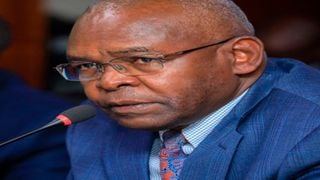
Central Bank Governor Dr Kamau Thugge on October 24, 2023. PHOTO | DENNIS ONSONGO | NMG
|CBK in major operation to stop aggressive dollar bids
The Central Bank of Kenya (CBK) is holding private meetings with banks to try to persuade them against aggressive quotes of the dollar in a bid to save the shilling from sliding past the 160 mark to the greenback amid the elevated pressure of servicing external loans.
Multiple sources from the industry who spoke to the Business Daily revealed that the CBK governor Kamau Thugge on Monday met bank CEOs and senior staff from treasury department in which he sought to reassure them of access to dollars so as to avoid making “panic and aggressive bids” on the shilling against the dollar.
The sources who spoke on condition of anonymity, shortly after the meeting, said Dr Thugge told banks that the CBK would be making available the dollars demanded by lenders.
The CBK is concerned that the December 5 decision to raise the central bank rate (CBR) from 10.5 percent to 12.5 percent—the highest in 11 years since September 5, 2012 when the rate was at 13 percent— has not arrested the fall in the shilling, save for the performance in the past five days.
“The CBK is now looking at the CBR as a loose handbrake in terms of helping the shilling. When it realised that the shilling was not behaving accordingly, it had to figure out where the cause of the problem was,” said one of the sources who was in the meeting at the CBK.
“That continued downfall of the shilling was basically a spiral effect of market sentiment because everyone is trading in panic mode. The meeting was to try and correct this market sentiment and to reassure the bankers that the reserves are there.”
The meeting with bankers, ahead of Tuesday’s monetary policy committee (MPC) meeting, comes on the back of the shilling having gained 0.15 percent against the dollar in the past five days of trading from the record low of 160.75 on January 30 to 160.51 at the start of trading on Monday.
Sources say the CBK thinks the shilling can average 155 to the dollar in the absence of aggressive bids.
Dr Thugge reportedly told the bankers that borrowings from external partners, including the International Monetary Fund (IMF) and the World Bank, had brought in dollars and more is expected to come in, which will be enough to meet their needs.
Data from the CBK shows usable foreign exchange reserves rose by $320 million (Sh51.36 billion) from January 18 to close February 1 at $7.134 billion (Sh1.144 trillion) or an equivalent of 3.8 months import cover.
Sources said Monday’s meeting also saw the CBK appeal to banks to shun aggressive bids in the ongoing infrastructure bond (IFB) sale in which the government is seeking Sh70 billion. The IFB will be on sale until February 14 and sources told the Business Daily Dr Thugge is keen on avoiding rates above 19.5 percent in order to keep the cost of domestic borrowing in check.
The moral persuasion approach marks a departure from the earlier stance in which the CBK has issued several warnings, backed with circulars, in a bid to support the shilling. Dr Thugge’s predecessor, Patrick Njoroge, was seen to get aggressive and threaten to use the “big stick,” according to the sources.
“For us, it is about credit portfolio management and so when CBK gives us the surety that they have the reserves and will be meeting our monthly needs, then we also tend not to increase our rates that much. When we are assured that we have these reserves, then when we get to the market, we don’t exercise the pressure that we have been under,” said another source.
“They are looking for a slight reprieve towards about 155 but we see this being short-term until that maturing $2 billion (Sh321 billion) Eurobond is successfully paid in June.”
The CBK finds itself in an unenviable position as the MPC meets this morning given that it had in December cited the need to curb inflation and prevent the shilling from depreciating further against the dollar. It had warned that it was ready to “further tighten monetary policy as necessary to ensure price and exchange rate stability” are achieved.
The MPC is meeting at a time when inflation has risen to 6.9 percent in January from the previous month’s 6.6 percent while the shilling has shed 4.9 percent since the last meeting when it was averaging 153.28 to the dollar.
Raising the CBR past the current 12.5 percent could trigger more defaults, with the CBK data showing the stock of non-performing loans had increased for five consecutive months to hit Sh635.8 billion at the end of November. A rise in the CBR could also mean higher interest rates for the government when accessing domestic debt—a development that would crowd out the private sector and increase the State’s cost of servicing local debt.
The CBK will have to find a way to wade through a tougher stance that has been taken by investors in the January bond sale as an indicator that investors will continue demanding a premium for lending to the government.





